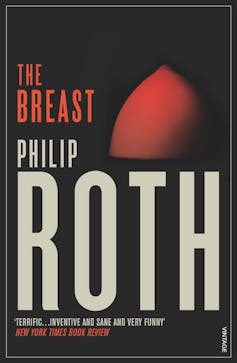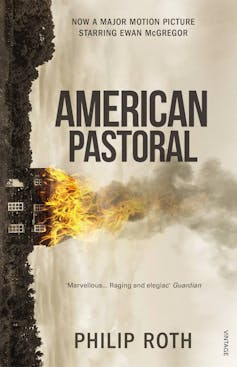
By David Brauner
For so long an enfant terrible of the American literary world, by the end of his life Philip Roth had become one of its elder statesmen. In a career that spanned more than half a century, Roth’s work ran the gamut of literary modes and genres.
There’s the high seriousness of Letting Go (1962) and the low humour of The Great American Novel (1973). There are the extravagant excesses of Portnoy’s Complaint (1969), couched in the form of a psychoanalytical monologue, and the pared-down, elliptical exchanges of Deception (1990), a novel written entirely in dialogue.

Then think of the social realism of Goodbye, Columbus (1959), that’s plot turns on the use of a birth control device in the period prior to the availability of the contraceptive pill, or the grotesque surrealism of The Breast (1972), the story of a professor of literature who metamorphoses overnight into a giant mammary gland. The versatility and variety of his work doesn’t end there. He also wrote an outrageous satire of an incumbent president in Our Gang (1971) and a dystopian tale of a fascist presidency in The Plot Against America (2004).
Although the style and content of Roth’s fiction is extraordinarily diverse, there is always audible a distinctive voice: irreverent yet earnest, questioning yet authoritative, subtle and nuanced yet powerful and passionate. But above all, Roth is obsessive, compulsive, restless, driven.
In an interview with the Paris Review in 1984, Roth remarked of his 1983 novel The Anatomy Lesson that: “The book won’t leave you alone. Won’t let up.” This applies equally to all his work. Roth’s work grabs you and won’t let you go. At one point in The Ghost Writer (1979) Nathan Zuckerman – the author protagonist of many of Roth’s novels – is told by his mentor, E I Lonoff, that he has “the most compelling voice I’ve encountered in years”.
It is that compelling voice which bewitched me when I read the opening pages of Portnoy’s Complaint as a teenager. It is that voice which still held me in thrall as I read the final words of his final novel, Nemesis (2010), as a middle-aged professor.
I have been reading Roth for over 30 years and writing about him, on and off, for more than two decades, and as with any long-term relationship, mine with Roth has had its ups and downs. But I have never felt like walking out or giving up. Roth will be remembered – and deserves to be celebrated – for his fearlessness, his formal audacity and stylistic brilliance, and his ability to reinvent himself in unexpected and sometimes startling ways.
In terms of his critical reputation, you could divide Roth’s career into three phases. There are the early successes of Goodbye, Columbus and Portnoy’s Complaint in the late 1950s and 60s, respectively, followed by the relatively fallow years of the 1970s and 80s, and then the triumphant second coming in the 1990s and the 2000s.

Yet this narrative is too simplistic. The period of greatest critical hostility and indifference – a period in which, to quote Nathan Zuckerman (pre-empting Roth’s critics, as ever), the author was widely accused of “disappear[ing] right up [his] own asshole” – was also a period of intensive experimentation, which revealed Roth’s refusal to rest on his laurels and determination to interrogate his own aesthetic and ethical beliefs with a rigor of which very few artists are capable.
Although the work produced in the 1970s and 80s was uneven, it paved the way for much of what was to follow and resulted in two masterpieces – The Ghost Writer (1979) and The Counterlife (1986). These novels stand alongside Sabbath’s Theater (1994) and American Pastoral (1997) as among the greatest post-war American novels.
Roth was a writer who polarised opinion, provoking strong reactions in many of his readers, but whether you loved him or hated him, his canonical status is beyond question. I believe he will come to be seen not merely as the preeminent post-war American novelist but as the most important American author of the 20th and early 21st centuries.
![]()
David Brauner is Professor of Contemporary Literatureat the University of Reading.





























Bill C says
“the most important American author of the 20th and early 21st centuries.” ??? One man’s opinion. My vote is for Toni Morrison. She won the Nobel Prize, Roth didn’t, for a reason.
Pierre Tristam says
Tolstoy, Chekhov, Nabokov, Joyce, Proust, Ibsen and Orwell didn’t win the Nobel either but Handke, Naipaul (emperor of the bores), Dario Fo, Elias Canetti, Churchill, Pearl Buck! and a few Scandinavian stumpers won it, among other unsolved mysteries, so who wins and loses that one doesn’t, I don’t think, say something about the writers so much as it does the committee and the times.
Pogo says
@Mr.Tristam
Roth, IMO too, definitely is canonical
“…and the times.”
Bill C says
It did say AMERICAN authors, 20th and 21st century. I agree that it has a lot to do with who’s judging and the times. The reason for my choice of Morrison is I think she is a better writer than Roth.
Bill C says
ps I often find it amusing to Google ‘Best Books Of (X) year’, go through the many reviews, and find only a few named in common on the various lists.
Pogo says
@Bill C
Well said. Could it be said, Morrison too?
Me, and Jesus, have little use for critics or superlatives.
And so it goes.
Bill C says
@ Pogo Yes, the same could be said of Morrison too, just as the same could be said of Bob Dylan, who was awarded the Nobel Prize for Literature in 2016.
Pogo says
@Pogo
You think my comment was a coincidence? Or Dylan’s prize obscure? Oh, well.
This isn’t either: